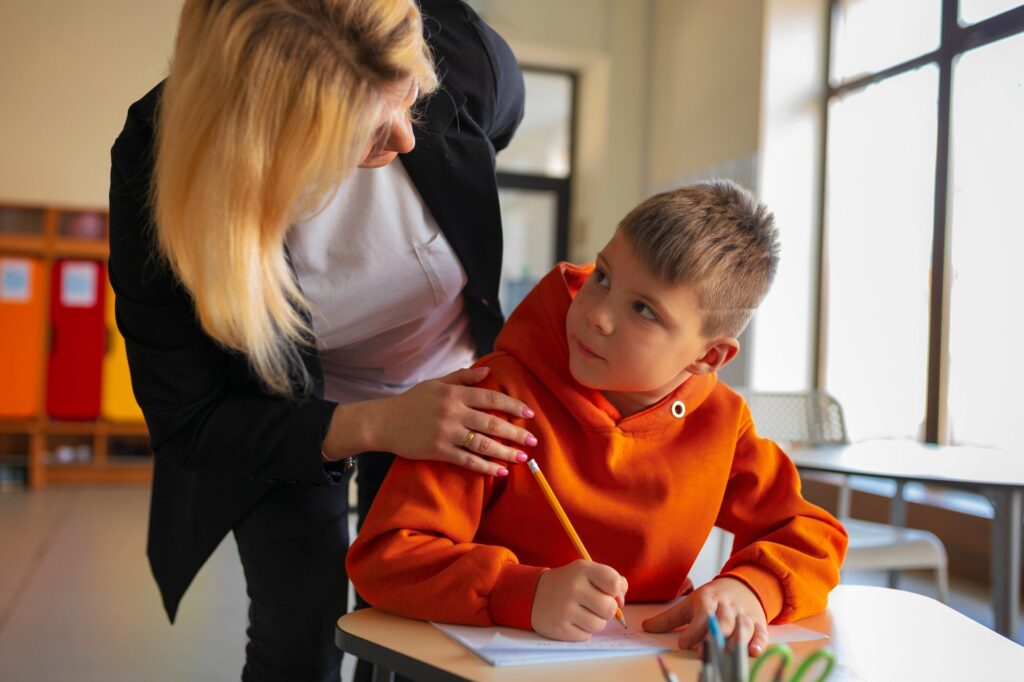The Attachment, Regulation, Competency Model (ARC) is a framework for intervention with youth and families who have experienced multiple and/or prolonged traumatic stress developed by the Trauma Center at Justice Resource Institute (www.traumacenter.org), the institute founded by Dr. Bessel van der Kolk, expert in childhood trauma. ARC, developed by Kristine M. Kinniburgh and Margaret E. Blaustein of the Trauma Center at JRI, identifies three core domains that are frequently impaired in traumatized children and youth – attachment, self-regulation and competency. ARC provides a theoretical framework, core principles of intervention, and a guiding structure for providers working with these children and their caregivers, while recognizing that a one-size-model does not fit all.
ARC is recognized by the National Child Traumatic Stress Network (NCTSN) as a promising practice for treating traumatized children. It is not a standardized protocol, but rather is a flexible framework, menu-based approach. Within the three core domains (attachment, self-regulation, and competency), ten building blocks of trauma-informed treatment and service are identified.
Attachment
Caregiver Affect Management
Attunement
Consistent Response
Routines and Rituals
Self-Regulation
Affect Identification
Affect Modulation
Affect Expression
Competency
Developmental Tasks
Executive Functions
Self Development
Understanding the Attachment, Regulation, and Competency Model (ARC)
Preliminary data from pilot studies indicate that ARC leads to reduction in child post-traumatic stress symptoms, anxiety, and depression, as well as increased adaptive and social skills. Caregivers report reduced distress and view their children’s behaviors as less dysfunctional. See the Trauma Center website for more information.
Imagine a child who has experienced complex trauma, struggling to make sense of their emotions, build healthy relationships, and navigate everyday challenges. Now imagine the same child, supported by a trauma-informed therapy that focuses on attachment, regulation, and competency, thriving and resilient in their journey towards healing. This is the promise of the Attachment, Regulation, and Competency (ARC) Model – a comprehensive, evidence-based intervention designed to help children and adolescents overcome the lasting effects of trauma and lead healthier, more fulfilling lives.
In this blog post, we will delve into the ARC Model’s inner workings, exploring its core domains, theoretical framework, and implementation process. We will also discuss the benefits for children and caregivers, and provide guidance on finding an ARC-informed therapist.
Key Takeaways
- The ARC Model is a theoretical framework that addresses the unique needs of children and adolescents who have experienced trauma, focusing on attachment, regulation, and competency.
- The model encourages an effective therapy approach to foster trust between therapist/child/caregiver(s) while providing numerous benefits such as improved mental health & increased adaptive skills.
- An online provider search tool helps individuals find an ARC-informed therapist or join the community for access to resources and support.
Exploring the ARC Model
The ARC Model, also known as the ARC framework, is a groundbreaking approach to trauma-informed therapy, offering a flexible framework designed specifically for children and adolescents who have experienced complex trauma, such as abuse, neglect, or exposure to violence. Developed at the Trauma Center at the Justice Resource Institute, the ARC Model focuses on three core domains: attachment, regulation, and competency, to support healing and resilience. Through its unique approach, ARC identifies the specific needs of these young individuals, ensuring a tailored therapeutic experience. With the help of arc leads, the framework can effectively address the challenges faced by those who have experienced complex trauma.
At its foundation, the ARC Model is rooted in attachment theory, child development, and traumatic stress research. It addresses the unique needs of young people and their caregiving systems, including parents, foster care providers, group homes, and teachers, by providing a guiding structure for trauma-informed care.
Core Domains of ARC
The core domains of ARC, based on core principles, are the backbone of this innovative treatment approach, offering a roadmap for healing and growth. These three core domains – attachment, regulation, and competency – are essential components of a child’s well-being and are frequently impacted by traumatic stress.
Attachment refers to the essential bond between a child and their caregiver(s), which serves as the foundation for a child’s emotional and social development. Regulation involves a child’s ability to understand and manage their emotions, while competency focuses on the development of essential life skills, such as problem-solving, communication, and social skills.
Addressing these core domains in therapy enables the ARC Model to assist children and caregivers in overcoming trauma-related challenges, paving the way for a brighter future.
Theoretical Framework
The theoretical framework of the ARC Model is grounded in:
- Normative childhood development
- Childhood trauma and traumatic stress
- Attachment theory
- Risk and resilience factors
This comprehensive framework allows therapists to gain a deep understanding of a child’s needs and adapt treatment accordingly.
The ARC Model draws from these diverse fields to establish a robust basis for interventions that cater to the individual child’s needs, thus fostering a more meaningful connection to the present and promoting attachment self-regulation.
Implementing the ARC Model
Implementing the ARC Model involves a multi-faceted approach, establishing a strong foundation for therapy through engagement, education, and routine. This foundation ensures that children and caregivers are well-prepared to address specific treatment targets within the core domains of attachment, regulation, and competency.
The ARC Model fosters a supportive and healing environment by emphasizing the need for:
- a safe and predictable atmosphere
- cultivating trust and understanding between the therapist, child, and caregiver(s)
- tackling potential barriers to treatment
This comprehensive approach ensures that therapy is tailored to the unique needs of each child and their caregiving system.
Building Blocks of ARC
The building blocks of the ARC Model lay the groundwork for successful therapy outcomes. These building blocks include:
- Creating a safe and predictable environment
- Allowing children and caregivers to feel more comfortable during therapy sessions
- Enabling deeper exploration of trauma-related experiences
By implementing these building blocks, therapists can help facilitate healing and growth in their clients.
Fostering trust and understanding between the therapist, child, and caregiver is another crucial building block of the ARC Model. This trust ensures open communication and collaboration throughout therapy, allowing the therapist to address potential barriers to treatment and provide the most effective support.
Core Targets in Treatment
Core targets in ARC treatment involve evaluating attachment patterns, teaching self-regulation skills, and strengthening developmental competencies. Addressing these targets enables the ARC Model to promote overall well-being and resilience in children and caregivers affected by trauma.
Evaluating attachment patterns allows therapists to understand the relationship between the caregiver and the child, and how it impacts the child’s development. Teaching self-regulation skills empowers children to manage their emotions and cope with stress more effectively. Strengthening self regulation and competency ensures that children have the necessary skills and abilities to function effectively in their environment, ultimately leading to improved mental health outcomes and a brighter future.
Benefits of the ARC Model for Children and Caregivers
The benefits of the ARC Model for children and caregivers are numerous, leading to increased adaptive skills and future resiliency, as well as strengthened caregiver-child relationships. These outcomes result in improved mental health and overall quality of life for those impacted by trauma.
Through the ARC Model, children develop secure attachment bonds, learn to regulate their emotions, and acquire essential coping strategies. Caregivers, in turn, receive comprehensive guidance on how to support their children through the healing process, fostering a nurturing and supportive family environment.
Increased Adaptive Skills and Future Resiliency
ARC-informed therapy provides a secure and supportive environment for children to develop increased adaptive skills and resilience. These skills, such as emotional regulation, trust-building, and healthy relationship formation, enable children to better cope with future challenges and lead healthier, more fulfilling lives.
The ARC Model empowers children to take control of their emotions, cultivate resilience, and make informed decisions as they navigate life’s challenges by enhancing important childhood skills and competencies that may be adversely impacted by traumatic stress.
Strengthened Caregiver-Child Relationships
The ARC Model places great importance on the development of strong caregiver-child relationships, which can lead to enhanced communication, trust, and support within the family system. These strengthened relationships play a crucial role in the healing process, as they provide a foundation for children to feel secure and supported as they navigate their trauma and its lasting effects.
The ARC Model enhances caregiver attunement and establishes a trauma-informed relational treatment environment by strengthening the adult caregiver’s supports, skills, and relational resources. This environment fosters healing, resilience, and positive outcomes for both children and caregivers impacted by trauma.
Finding an ARC-Informed Therapist
Finding an ARC-informed therapist is an essential step in ensuring that children and caregivers receive the appropriate and effective treatment they need. With the right therapist, the ARC Model can provide a comprehensive, trauma-informed approach that addresses the unique needs of each individual and their caregiving system.
To find an ARC-informed therapist, individuals can utilize the ARC provider search tool and join the ARC community to access resources and support. These tools can help families find the right therapist and connect with others who share similar experiences, providing valuable guidance and encouragement throughout the healing process.
ARC Provider Search Tool
The ARC provider search tool is an invaluable resource for individuals seeking an ARC-informed therapist. Users can find a list of therapists who specialize in the ARC Model by entering their location and preferences, thereby ensuring they receive appropriate and effective treatment for children and adolescents with complex trauma.
In addition to providing contact information for therapists, the ARC provider search tool also offers details about each therapist’s credentials, experience, and specialties. This information can help individuals make an informed decision when choosing the best therapist to meet their needs.
Joining the ARC Community
Joining the ARC community provides access to a wealth of resources, support, and networking opportunities for individuals seeking ARC-informed therapy or professionals looking to implement the ARC Model in their practice. When users join the community, they gain access to webinars, articles, and other resources related to the ARC Model, and can connect with others who share their experiences and challenges.
To join the ARC community, individuals can sign up for membership, attend events, or participate in online forums. Through these channels, users can learn more about the ARC Model, its implementation, and its benefits, as well as engage with others who share their passion for trauma-informed care.
Summary
Throughout this blog post, we have explored the ARC Model as a powerful, trauma-informed approach to therapy for children and adolescents with complex trauma. By focusing on the core domains of attachment, regulation, and competency, the ARC Model provides a comprehensive framework for healing and growth, leading to improved mental health outcomes and quality of life for both children and caregivers.
As we have seen, the ARC Model offers hope and transformation for those affected by trauma. By finding an ARC-informed therapist and engaging with the ARC community, families can access the support and resources they need to embark on a journey towards healing, resilience, and a brighter future.
Frequently Asked Questions
What is ARC behavior?
ARC behavior is an intervention framework that encourages Attachment, Self-Regulation, and Competency with youth and families affected by trauma.
What is the ARC model of anxiety?
The ARC model of anxiety, developed by Kinniburgh and Blaustein, identifies three core domains affected by trauma – attachment, self-regulation, and competency.
This trauma-informed treatment approach addresses the damage complex trauma can do to a person’s attachment patterns, self-regulation, and basic developmental skills.
What is ARC treatment for children?
ARC is a trauma-informed framework for intervention with youth and families who have experienced prolonged traumatic stress. It focuses on improving attachment, self-regulation, and competency.
How is the ARC Model implemented in therapy?
The ARC Model is implemented through the establishment of a strong therapeutic foundation and by addressing specific treatment objectives within the core domains.
These objectives are designed to help the client develop a better understanding of their own behavior, thoughts, and feelings, as well as develop the skills necessary to manage their emotions and behavior in a more adaptive manner.
Links:
The Trauma Center at JRI
Intervention Beyond the Child: The Intertwining Nature of Attachment and Trauma
New York Times Opinion Page article from Dr. van der Kolk




